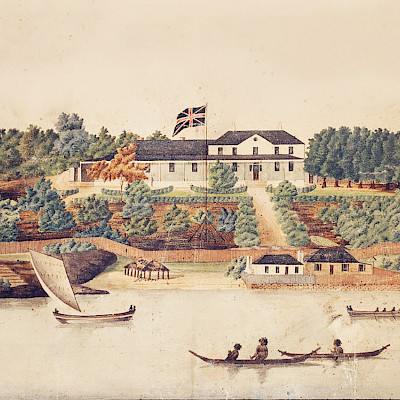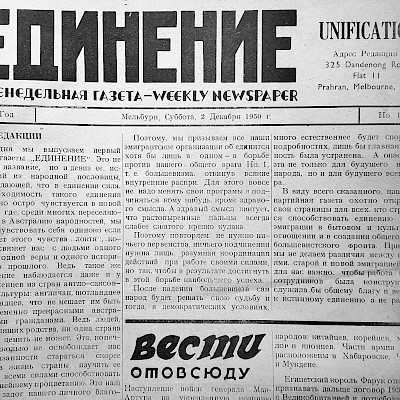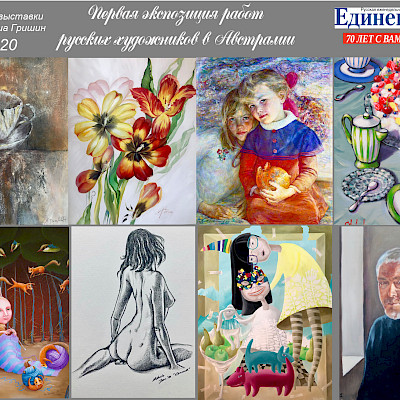In the previous article, Keith Clark and I told the readers of the Unification about his grandmother, Agnia Prokopyevna Khabaroff. In this article, we will talk about another representative of this genus – Agnia’s half-sister, Ludmila (Lydia) Prokopyevna and her family, who moved to Australia in the 1950s.
The daughter of the titular adviser Prokopy Khabaroff from his first marriage, Ludmila, was born in 1887 in the city of Nikolaevsk-on-Amur. In 1906, she married an officer of the 1st Nerchinsk regiment of the Trans-Baikal Cossack Host, centurion Leonid Vitalievich Verigo. By this time, a graduate of the Kazan Military School, he was already a participant in the suppression of the Boxer Uprising in China and the Russo-Japanese War, where he was awarded the Order of St. Anna, 4th degree for bravery.
Soon after the wedding, the couple had a daughter, Agnia. 2 years later, Lydia was born, and in 1911, Ludmila bore a son for her husband. The boy was named Vitaly, in honour of his paternal grandfather. Leonid Vitalievich went to the Great War as a captain as part of the 3rd Black Sea regiment of the Kuban Cossack Army, who fought on the Caucasian Front, and graduated with the rank of colonel and commander of the Ussuri regiment, with whom he arrived at the Manchuria station in January 1918.
In the Civil War, Colonel Verigo served with Ataman Semyonov, commanded the troops of the Amur Region, was the head of the garrison in Khabarovsk, and from 1919 to 1920 he was the commander of the Vladivostok fortress. He then spent almost 2 years in China, and returned to Russia, but by this time the fate of the White movement was already a foregone conclusion. In the fall of 1922, along with thousands of other refugees, among whom was his nephew, Arseny Savitsky, he left his homeland on the ships of the Siberian Squadron of Rear Admiral George Stark.
Once in "East Paris", as Shanghai was then called, Verigo settled in the French Quarter. The former major general, who was equally well versed in both horses and technical skills, became a driver, and was later in charge of a garage. In the mid-1920s, the family moved to Harbin, where he worked at an automobile trading company, and Ludmila Prokopyevna opened a small hat store. For reasons unknown, the couple divorced in 1927.
For several years Leonid Vitalievich served in the Russian Orthodox Mission in Beijing, then moved to Mukden and up to 1935 worked as a technician at a Japanese aircraft factory, from where he was fired due to his age. After returning to Harbin, Verigo came under the scrutiny of the special services because of his political views: he never changed his opinion and did not accept the Bolsheviks, but also considered it dishonourable to cooperate with Hitler's allies.
From time to time, the general wrote articles for Russian-language newspapers, in which he harshly criticized the local authorities, as well as his former commander - Ataman Semyonov, and officers and emigrants who joined the Nazis. He was constantly monitored and was arrested several times; as a result, he lost his job, and, unable to get anywhere from Harbin, was occasionally given odd jobs in the Union of Horse Breeders.
From time to time, through confidants, he received news about his family, but for many years he was away from his relatives and missed them very much. On March 1, 1944, Leonid Vitalievich Verigo died of a heart attack in a small cell of the man’s Orthodox monastery of the Kazan-Mother of God, where he had recently been living. A few friends and former fellow servicemen buried him at the New Assumption Cemetery in Harbin. This necropolis, like many others in China, was completely destroyed during the Cultural Revolution.
Ludmila Prokopyevna moved to Hong Kong with her children in the late 1920s. In May 1930, her son, Vitaly, joined the local police. He was assigned to the anti-piracy department, where 25 Russians had already served - Konstantin Alexandrovich Kriloff, Boris Vasilyevich Levkovich, Fedor Loginovich Zadorin and many others. In the same year, Agnia married Vladimir Sergeenko and in April 1931, in Shanghai, they had a son, George. But this marriage turned out to be fragile and the couple divorced.
After 5 years, Aga became the wife of the Dutchman Johannes Havelaar, who was employed in an import-export business in Hong Kong. In 1940, the couple left for the United States and settled in California. Three years later, Johannes joined the army, received citizenship, fought in World War 2 and rose to the rank of lieutenant. After demobilization, he continued to do business in San Francisco. Agnia worked as a nurse and her son entered the Oakland Technical College.
In 1934, the wedding of Ludmila’s youngest daughter, Lydia, was celebrated. Her chosen husband was a friend and fellow serviceman of his brother, named Konstantin Kriloff. Two years later, Vitaly married a Russian girl - Antonina Gourieva. In 1940, Japan entered World War II, but before the outbreak of hostilities, he managed to send his wife to Australia. In Brisbane, Antonina became a member of the Russian branch of the Red Cross and took part in its charitable activities.
On December 3, possibly on one of the last transports, the Kriloffs left Hong Kong. In Singapore, the ship was bombed, but they managed to get to Australia. Under the name Alexander Kennedy, Konstantin joined the Armed Forces. He also served in the British Army Assistance Group (BAAG) - this unit, among other things, assisted soldiers who managed to escape from Japanese prisoner camps; participated in clandestine operations in China and Burma, and ended the war in India with the rank of 2nd lieutenant of the Royal Air Force (RAF).
On December 8, 1941, the Japanese attacked Hong Kong and captured it on Christmas Day. Not all of the Kingdom's subjects were evacuated - 2,800 men, women and children were thrown into the Stanley Internment Camp and among them were Vitaly and Arseny Savitsky. They remained imprisoned there until 1945, when the island was liberated by British troops. There, Verigo met Aileen Thirlwell and in 1944, they had a daughter, who was named Lydia Elizabeth.
After the war, Vitaly returned to serve in the Hong Kong police and in 1948, he and Aileen were finally able to officially register their marriage. In the same year, their son, Anthony (Tony), was born, and four years later, their second daughter, Veronica (Nikki), was born. In 1955, Inspector Verigo retired and decided to reunite with his wider family, who then lived in Australia.
In 1947, Ludmila Prokopyevna received British citizenship. In her statement, it is stated that she was a widow - apparently, some information about Leonid Vitalievich did reach the family. In the early 1950s, she went to live with her daughter - Lydia and her husband, who by that time had retired from the Hong Kong police and had moved to Brisbane. The Kriloffs bought a house on Bent Street in Toowong, but in May 1954, Konstantin Alexandrovich died of cancer. The service was held it in St. Nicholas Cathedral officiated by Fr. Valentin Antonieff.
Mother and daughter moved to Copeland Street in Milton. A year later, Vitaly came to Australia with his family. At first, he delivered bread, getting a job in one of the bakeries in Taringa, and Lydia worked as a cleaner in the Treasury Building on Queen Street. Both of them became guarantors for moving to Australia for aunt Agnia and her husband, Mikhail Korenev, who arrived in Brisbane in 1957.
In the same year, Vitaly and Aileen had a third daughter, Leonora Teresa. The fifth child, Valerie Gay, was born when dad was already over 50, in 1963. The head of this large family, now lived at 22 Pearl Street, Scarborough and worked as a security guard at Woodland Ltd in Geebung. And next to them, in Redcliffe, aunt Lydia and grandmother Ludmila also settled.
I think she would have been happy - after all, there were children, grandchildren and her sister Agnia nearby ... Ludmila Prokopyevna passed on in 1974 and she was buried in Redcliffe Cemetery. In 1982, at the age of just 34, Anthony Verigo died, and his death crippled his family. A year later, Lydia Kriloff also passed away - she had survived her husband by almost 30 years and the couple rest in the same grave in Toowong. In 1986, but on different continents, Agnia and Vitaly both passed on and Aileen Verigo died 5 years after her husband – both were cremated and the ashes were scattered in different locations.
Their daughters now live in the Brisbane area. In 2015, three of the sisters took part in a Meeting of Relatives of former prisoners of Stanley Internment Camp in Hong Kong, who came to gather for the event from around the world. They visited the site of Stanley Camp and the War memorial cemetery, where prisoners who died in custody are buried. For the first time in many years, Lydia Elizabeth was able to visit the place where her father met her mother, where she was born and where the history of their family began.
Victoria Smolin (Russia) and Keith Clark (United Kingdom)
Photo captions:
01 - The last shelter of Leonid Vitalyevich Verigo (1879-1944) in Harbin
02 - Separated from his family, the general missed them very much
03 - Ludmila Prokopyevna with children (Lydia, Vitaly & Agnia), Shanghai
04 - Formation on the parade ground in front of the HK Police Department building. Inspector Verigo.
05 - Wedding of Vitaly and Antonina Gourieva, 1936, Hong Kong.
06 - Civilian prisoners were held at Stanley Camp
07 - Agnia Havelaar and George at the US Citizenship Certificate Ceremony
08 - Konstantin Alexandrovich Kriloff died in 1954 at the age of 49
09 - Vitaly and Eileen Verigo's house on Pearl Street in Scarborough
10ab - The graves of Konstantin and Lydia Kriloff and Lydia Prokopyevna Verigo
The illustrations are taken from open sources on the Internet, 10a - by V. Smolin. A huge tribute to the Old Hong Kong site, its owners and volunteers for their tireless work in preserving the history of the colony.


























